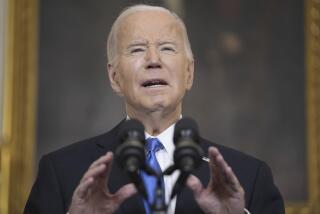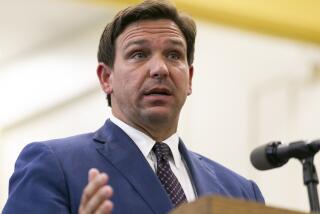Campaign ’96 / THE MEDIA : Buchanan Is the Press’ Favorite Son--and Its Whipping Boy : Journalists are alternately delighted and repelled by a former colleague who has turned a moribund race into political history.
- Share via
NEW YORK — For the national media, Patrick J. Buchanan is like the mythical pushmi-pullyou, a creature that repels and attracts simultaneously.
The attraction for many journalists is that Buchanan is one of their own--he started as an editorial writer at a St. Louis newspaper and became nationally known during his years as a conservative commentator on CNN. Instead of “governor” or “senator” or even “Mr. Forbes,” Buchanan is simply “Pat” to the many national reporters who have known him for years.
After hundreds of talk shows and political conversations, they are personally aware of Buchanan’s engaging nature, his easy laugh even at the lamest of political jokes, his courtesy about allowing the other side to have its share of the allotted air time.
Moreover, journalists by nature thrive on Buchanan’s “red meat” rhetoric that has suddenly given life to the Republican presidential campaign--making it a potentially history-making contest instead of the boringly inevitable crowning of Senate Majority Leader Bob Dole that had seemed likely only a few short weeks ago.
But if Buchanan has his journalistic allure, he also has ignited an outcry in the media that some say has not been seen since the coverage of Barry Goldwater, the GOP’s presidential nominee in 1964. Like Goldwater, who was painted by many in the media as an extremist, Buchanan’s America-first positions on trade and immigration, his rock-hard stand against abortion, his appeal to the gun owners and antigovernment fringe groups are views that concern many members of the establishment press.
One need only scan this week’s news magazines to gauge Buchanan’s impact. Newsweek’s cover features a somber-looking Buchanan, his hands clasped, with the headline: “Preaching Fear. Why America Is Listening.” U.S. News & World Report’s cover offers a smiling picture of the candidate with the headline: “The Loose Buchanan. The GOP’s Panic Attack.”
Buchanan didn’t make the cover of Time, but a small strip on the magazine’s front promotes “The Case Against Buchanan.” The story inside notes that Buchanan “is under growing fire, mostly from Republicans,” and examines whether his critics are on target.
“There are an awful lot of journalists who find what Buchanan says utterly abhorrent, but they have been giggling along with him,” says Newsweek’s Joe Klein. “Part of every one of us is a theater critic, and he is appealing to that part. But the policy wonk in me is appalled.”
Hendrik Hertzberg, editorial director of the New Yorker magazine, picked a more brutal metaphor, comparing Buchanan to another political leader who started off as a journalist. “This is probably how the press corps felt about Mussolini,” he said.
With Buchanan now emerging as a candidate with a serious shot at the nomination, a candidacy that had been treated as a political sideline has now ignited into serious business. Buchanan’s long record of talk show rhetoric--much of it designed to use controversy as entertainment--is already beginning to haunt him. His attacks on AT&T; for its decision to lay off about 40,000 employees is being compared to his stock portfolio, which includes AT&T.;
“Now you are going to see the Republicans and Wall Street and the black groups and the Jewish groups all going into action, and all this stuff is going to come out about him,” CBS commentator Bob Beckel, a former Democratic political consultant, predicted last week after Buchanan’s win in the New Hampshire primary.
“You are about to see some of the most brutal press coverage of any candidate since probably Goldwater,” he said.
Goldwater, who lost in 1964 by a landslide to President Lyndon B. Johnson, for years blamed the media for his loss. In a United Press International interview in 1987, the former Arizona senator said: “If my name wasn’t Barry Goldwater and I had to depend on my knowledge of him by what I read in the press in 1964, I wouldn’t have voted for the son of a bitch either. The press’ treatment of me was so distorted.”
In unexpected ways, Buchanan’s political rise may be dividing the media in much the same way it is the GOP, several media analysts have suggested. New York Daily News columnist Lars Erik Nelson argued that Buchanan, who appeals to workers with conservative social views, has split the voters and many in the media along new lines. Instead of left versus right, it is the elite versus Buchanan’s “peasants,” as the candidate has taked to calling his followers.
Already, some of Buchanan’s strongest criticism is coming from the Republican voices in the media. Fred Barnes, a columnist for the conservative publication Weekly Standard, and William Kristol, the magazine’s editor and publisher, both expressed concern in recent days that Buchanan will divide and weaken the Republican Party, destroying in the process its new majorities in both houses of Congress.
“He’s insufferable,” Barnes said as the first New Hampshire votes started showing Buchanan in the lead last week. “Come about 10 o’clock tonight he’s going to be even more insufferable. I like Pat personally, but he’s suddenly gotten carried away with his own rhetoric.”
Barnes added that a wave of criticism coming from the media and the nation’s elites--including Republican Party leaders--would only serve as “fuel” among Buchanan’s loyal following.
In another odd twist, there are voices on the left within the media defending parts of Buchanan’s message even while they distance themselves from the messenger. That’s because Buchanan is drawing on some liberal themes--supporting those who have lost their jobs in an era of business downsizing, criticizing banks and corporations for getting too rich too fast. But there are other issues as well that have rallied some unlikely allies to Buchanan’s defense.
The Boston Globe’s Thomas Oliphant, for example, stirred intense controversy among fellow reporters recently with a column that accused his colleagues of smearing Buchanan with “three of the ugliest words in public discourse--guilt by association.”
Oliphant was outraged about recent stories tarring Buchanan as racist or anti-Semitic because one of his chief campaign aides, Larry Pratt, who also serves as a director of Gun Owners of America, has appeared at forums that also featured white supremacists.
“Since the Pratt story broke, it has been open season, with an ethically challenged press now fanning the flames,” Oliphant fumed.
And while the press may have been too soft on Buchanan earlier in the campaign cycle, some now suggest that commentators have begun going overboard in the other direction--making cracks about him that they would be unlikely to utter publicly about another politician.
Critics point, for example, to comments last week by Christopher Matthews, columnist for the San Francisco Examiner and commentator on ABC-TV. Opining that Buchanan “hits every button on the right” at his rallies, Matthews added, “I haven’t seen anything like it. But I’ve never been to a Nuremberg rally.”
For many in the media, the feelings about Buchanan are an uncomfortable mix of personal versus professional and political. As Jack Germond put it on ABC’s “Nightline” on Friday: “I’ve known Pat for 30 years, and I think he’s a certifiable nut, and I can say that because I’ve said it to his face.
“But,” adds Germond, “I still sort of like him.”
Such feelings may soon be shed as the media examine Buchanan’s record--not as one of their pack, but as a possible nominee for the highest elective office in the land.
New York Times columnist William Safire, who has known Buchanan since the days when they both worked as aides to President Nixon, said Sunday on NBC’s “Meet the Press” that Buchanan is an “extremist” whose anti-Semitism would rank at a level four or five--on a scale that has Adolf Hitler as a 10 and Black Muslim leader Rev. Louis Farrakhan as a seven.
But Safire chastised his colleagues for treating Buchanan differently because he is one of their own.
“When we all refer to him as ‘Pat’ rather than Mr. Buchanan, it is a mistake on our part,” Safire said. “He’s Mr. Buchanan now.”
More to Read
Get the L.A. Times Politics newsletter
Deeply reported insights into legislation, politics and policy from Sacramento, Washington and beyond. In your inbox twice per week.
You may occasionally receive promotional content from the Los Angeles Times.










